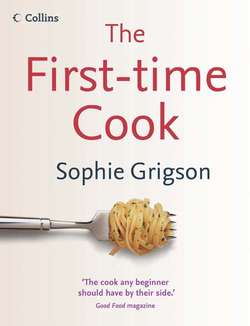Читать книгу The First-Time Cook - Sophie Grigson, Sophie Grigson - Страница 73
Primary Cooking Methods Boiling
ОглавлениеFirst of all, get your eggs out of the fridge at least 15 minutes before cooking if at all possible. This reduces the likelihood of shell-cracking in the heat of the saucepan. Pour enough water to submerge the eggs, into a pan that is just large enough to hold the eggs in a single layer (an over-large pan encourages the eggs to ricochet off the sides and each other, which is another reason they may crack). Bring the water up to the boil, then lower the eggs on a spoon into the water, one by one. Reduce the heat so that the water is simmering rather than bubbling violently. Set your timer to 5 minutes for soft-boiled eggs with a runny yolk and just set white, or 8 minutes for just hard-boiled eggs (firm white, creamy set yolk), 10 minutes for fully hard-boiled eggs.
Presumably you will be eating your soft-boiled egg while still hot from the water, so dish up immediately. If a hard-boiled egg is for a salad, or other cold dish, plunge it straight into cold water as soon as it is cooked, to prevent the formation of a discoloured green-black ring around the yolk. Not an attractive sight.
To shell a hard-boiled egg, tap the egg against the work surface, turning to break the shell all over. Pull off the shell, along with the thin membrane that lies underneath (easier to do with fresher eggs).
